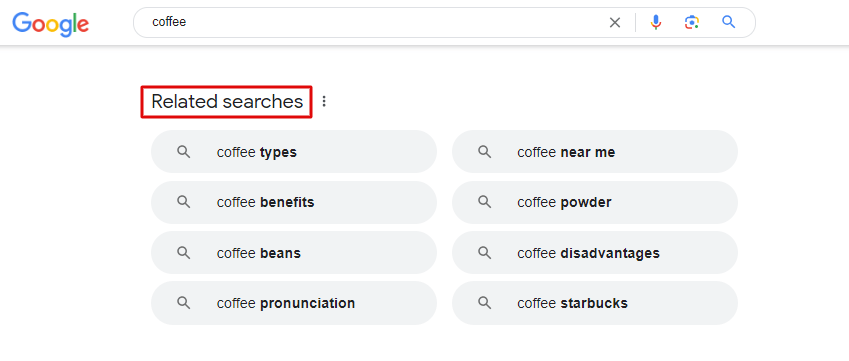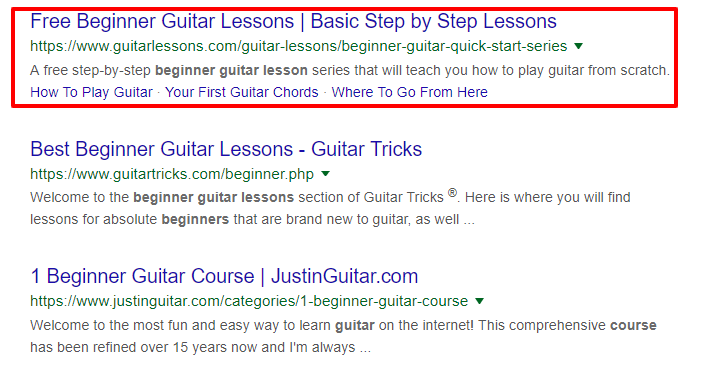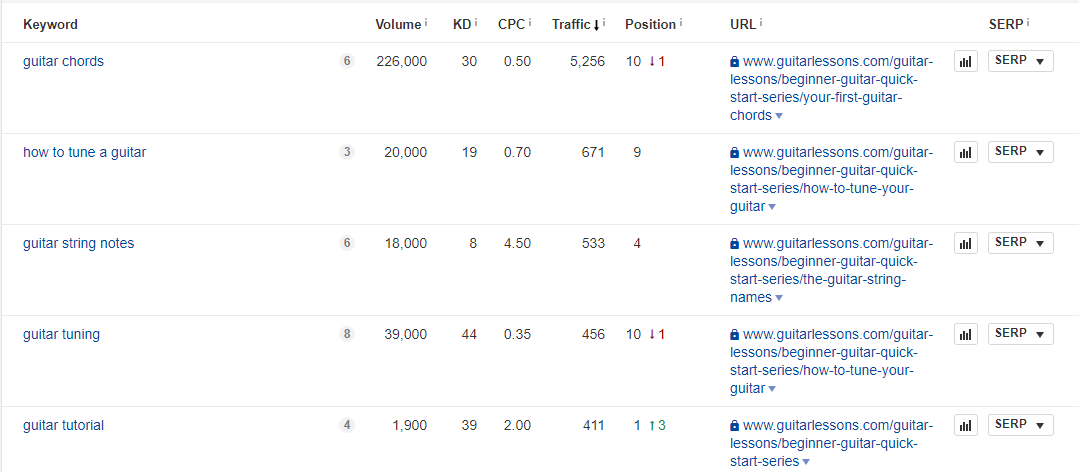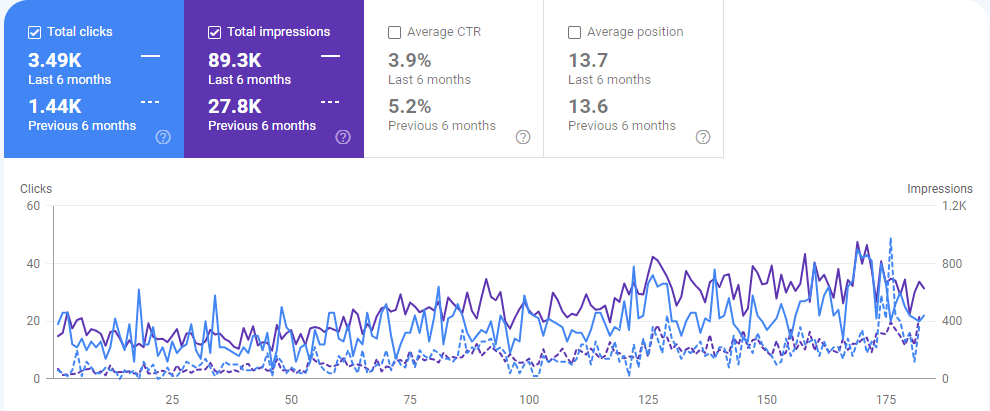Ever wonder how your search leads you to exactly what you need? That’s where the concept of keyword research jumps in. Keyword research bridges the gap between what users type into search engines and what the site offers.
You’re here, probably after typing in “keyword research strategies” into the search engine. See, here’s the catch– we matched your search intent.
Through years of experience, we have learned that aligning content with the right keywords and search intent can significantly impact visibility. In this article, we are sharing some goldmine tactics that we have battle-tested and refined through trial and error.
What is Keyword Research?
Keyword research involves finding relevant and popular keywords or search queries that people type into Google, Bing, and other search engines. It’s the process of understanding what users are seeking—be it information, products, or services.
Essentially, keyword research helps you target and link the right keywords to your website and its pages, attracting relevant visitors and enhancing online visibility.
Why is keyword research important?
Imagine having a perfect site with great content, but no one knows it exists. That’s where keywords come into play– acting like the guiding lights to your informative content.
We strongly believe that each keyword tells a story– a story about what the audience is looking for. Therefore, keyword research is essential because it gives insights into the exact search terms visitors use while searching for specific information. This helps in creating targeted content and boosting website traffic.
Key Elements of Keyword Research to Target the Right Phrases
- Keyword Search Intent: Keyword Search Intent simply refers to the intention of the user behind a particular search. For example: If someone searches for “how to tie a tie,” their intent is likely instructional, i.e., they want guidance on tying a tie and not buying one. Understanding the user’s search intent helps create content relevant to the target audience’s queries.
- Monthly Search Volume: It is the metric that demonstrates how many times a particular query is put into the search engine per month. We advise against solely relying upon search volume in your keyword research process because high search volume keywords mostly attract just browsing traffic and no conversions.
- Keyword Difficulty: Keyword difficulty gives you an idea of how difficult it would be to rank for a particular keyword. In our advice, if you’re a small business or have just started out your website, it is better to target keywords having lower KD as they are less competitive. However, if you’re a well-established business with strong domain authority, you can choose competitive keywords as well.
- Long Tail Keywords: Long tail keywords consist of more than two or three search terms or phrases. These are focused terms that convert well because of their high specificity.
- Short Tail Keywords: Short tail keywords, also known as seed keywords, are single-word queries. These keywords usually cover broad topics and have a high search volume.
6 Powerful Keyword Research Strategies Based on Industry Experience
For over a decade, we have served our clients with exceptional SEO services and have helped them climb up the search engine rankings. During our journey, we have learned that good keyword research is the secret sauce for any successful SEO campaign.
Drawing from our extensive experience, we are sharing some battle-tested strategies that we have refined through years of trial and error. Implementing these strategies will help you grow your site’s search traffic to thousands and millions of unique visitors per month.
Brainstorm Ideas and Enlist Relevant Keywords
The very first thing is to make a list of the topics that are related to your business. Think from a customer’s perspective, brainstorm endless topics, and enlist the “seed keywords” — broad terms that are most likely to be searched by the target audience. Once you have a list of seed keywords, the next strategy is to identify more specific terms– long tail keywords.
To refine your keyword selection, evaluating factors like search volume and competition is crucial. Tools like SEMrush or Ahrefs can be of immense help in comparing and analyzing these metrics.
Tip: Our firsthand experience says that keeping the search intent in mind while shortlisting the keywords is very important.
For instance, we helped our client, who owns a skincare brand, increase their organic visibility by targeting a specific audience using relevant keywords.
To start with, we made a list of seed keywords. The initial keywords that popped into mind were “organic skincare,” “natural skincare,” “glass skin,” “skincare for sensitive skin,” etc.
To check for any keyword gaps, we always conduct a quick competitor analysis, which we performed in this case too.
To streamline the list, we hopped onto discovering long tail keywords and came up with “best organic face moisturizer for sensitive skin,” “gentle natural cleanser for acne-prone skin,” and “hypoallergenic skincare routine.” We checked the search volume and competition on Ahrefs to further analyze our selected keywords.
The next step was aligning the content around these keywords. After combining other keyword research strategies, our team targeted the keyword “Best organic face moisturizer for sensitive skin” for a blog post highlighting “The benefits of using (brand’s) moisturizer.”
By combining these tactics overlapped with factors like search intent and search volume, we witnessed a significant increase in the client’s organic visibility, further enhancing their conversion rates.
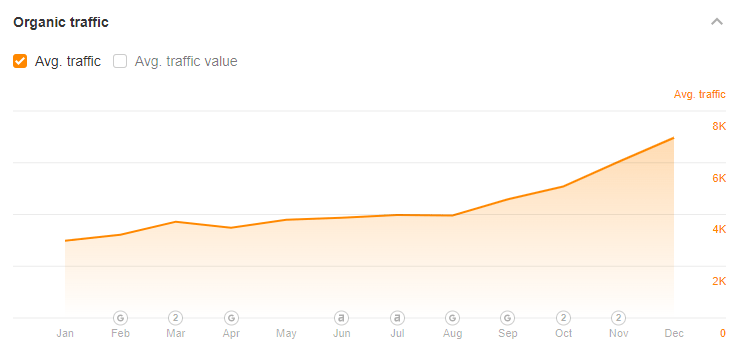
Try Google’s “Related Searches”
Google’s “related searches” is an amazing feature that can streamline your keyword research process. Google relentlessly provides valuable insights into users’ search intent and variations of the most popular keywords. All you have to do is put your query in the search bar, and it will come up with solid keyword ideas.
For example, put the keyword “coffee” into Google search. Once you do that, scroll down toward the bottom of the page to find the list of 8 keywords that closely align with your search term.
You can click on any of these to further get additional keyword ideas.
Our team often uses this feature to expand the keyword lists and understand broader user interests. However, these lists are only a starting point and must be combined with other keyword research tools and strategies to ensure a comprehensive keyword approach.
Google and YouTube Autosuggestions
Besides the “related searches” attribute, Google also provides “autosuggestion feature,” which gives you a list of helpful keywords that you can include in your target keyword list. These keywords are important because Google only suggests the terms people actively search for.
For example, while optimizing content for a client in the tech industry, our Google search for “best smartphones” led to an autosuggestion “best smartphones under $200”. In addition to providing new content ideas, these autosuggestions provided insights into user preferences and budget considerations. This technique taught us that aligning content around users’ queries can significantly boost website traffic (like it did for our client).
This practice must not stop at Google alone; you must try “YouTube suggestions” as well. The process is similar: head to YouTube, put your term in the search bar, and wait for it to come up with content ideas.
Incorporating Google and YouTube autosuggestion features into the keyword research strategy ensures the content resonates with what users are actively searching for, driving better engagement and visibility.
Run Competitor Search
We strongly suggest running a competitor analysis to gain valuable insights into the high-performing keywords they are targeting. It also enables you to understand how your website is doing in comparison and helps discover any content gaps, if present.
By analyzing competitor data, we have identified niches where our clients could excel, which often helps us tailor the content to meet specific user demands.
Based on our experiences, let us guide you through the process of conducting a manual competitor analysis.
All you have to do is put your keywords or topic in the Google search bar. The top results that appear are your potential competitors that can provide you with a list of relevant keywords to target.
For example, let’s assume you teach guitar and put query “guitar lessons for beginners” in Google’s search bar. Now, wait for the top results to appear. So, the ranking results that you see on the top pages of Google are your potential competitors.
To analyze the keywords that these sites rank for, you can use tools like Ahrefs, Moz, SpyFu, SEMrush, etc.
For instance, among these results, select any, let’s say the first one as it is ranking at #1 position. Now, copy the link address and put it into Ahrefs’ Site explorer tool to analyze the website and find the keywords for which it ranks.
By doing so, you can check the search terms that your competitors are using to find opportunities and keyword ideas for your business.
We believe that competitor analysis assists in learning more about your competitor’s strategies and gives insights about how to outrank them. Ultimately, boosting website traffic and enhancing conversions.
Use Google Search Console to Identify Ranking Keywords
Another effective SEO keyword research strategy is to identify keywords that your website already ranks for using Google Search Console. Because if your website has been in the market for a while, it will likely certainly rank for certain keywords.
How Google Search Console’s Performance Report help you in Keyword Research?
Well! Once you head to the “Queries” section in Google Search Console, you can analyze the search queries that people are using to find your site—they’re the ones with impressions and clicks.
The trick is to identify queries with tons of impressions but no clicks, signaling that your current URLs are quite irrelevant. This is where the focus should be in order to improve content targeting.
To brief you further, while analyzing Google Search Console’s data for our client in the fashion industry, we discovered that the website was ranking for “cute summer dresses” but had a low click-through rate. Based on this data, we revamped the meta descriptions and titles for the target keyword. This led to an appreciable increase in clicks and traffic for that specific keyword.
Leverage Keyword Research Tools
Keyword research tools offer valuable insights into search volumes, competition, and related keywords, enabling you to make informed decisions. SEMrush, Ahrefs, and Moz are our personal favorites for keyword research. to uncover high-potential keywords and understand user intent.
You must hop on to our detailed article on keyword research tools to draw a clean comparison between free and paid versions of these research tools.
Exceptional Tips to Streamline Your Keyword Research Process (tried and tested by experts)
Use Longtail Keywords
Single word searches usually fail to come up with the desired results as they are broad and competitive terms. Therefore, we advise using longtail keywords as these are less competitive and have a higher conversion rate due to their specificity towards a particular topic or product.
Leverage Topic Clusters
Clustering or grouping keywords into “topic clusters” is a smart way to strengthen a website’s topic authority. This is how we prepare our topic clusters:
- Choose a high-volume seed keyword.
- Find other keywords related to the seed keyword.
- Create content pages for each targeted keyword.
- Leverage “internal linking” to connect the pages with the same topic.

Follow the Search Intent
Always review the search intent for the shortlisted keywords that you would like to target. For instance, some people are looking to read content regarding the topic while others are looking to buy something. As an example, a customer searching for “buy MacBook charger” is most likely to buy a new charger for his MacBook while a person searching for “best Apple gadgets” only wants to gain some information about Apple gadgets.
Based on personal experience we recommend you to acknowledge which category the target keyword falls under. A keyword, in general, can be divided into the four categories.
- Informational
- Navigational
- Commercial
- Transactional
Each of these categories serves different user intent. You can understand the search intent more closely by looking at the top pages that already rank for your target keyword.
Add Related Keywords
Related keywords help broaden the understanding and relevance of the content. We advise you to incorporate related keywords in your content. This can help you target a broader audience and enhance your overall SEO strategy. Furthermore, when your web pages have related and similar keywords (also known as LSI keywords), it becomes easy for the search engine crawler to index and rank the pages for a specific search query.
Monitor Keyword Research Strategies
Analyzing and monitoring your keyword research strategies is highly recommended. You must always go back and evaluate your blog posts in the SERPs and check their rankings to see if the efforts are paying off. While you are at it, you must also ensure that your content is fresh and updated.
Outcomes of a Robust Keyword Research Strategy
When you conduct thorough keyword research and strategically include the search terms or keywords in your content, it reaps the following benefits:
- Offers answers and solutions to the questions your target audience is asking.
- Helps connect your potential customers to your website.
- Helps your content appear higher in search engine results.
- Better online visibility.
- Drives organic traffic to your website.
- Improves the lead quality and conversion rate.
- Increases brand awareness.
Here’s How We Can Contribute to Your Keyword Research Journey
As you now know, “keyword research” plays a vital role in a successful digital marketing strategy. By mastering keyword research strategies, you can optimize your content to match user intent, improving your website’s visibility in search engine results.
However, keyword research is a never-ending process that must be conducted regularly in order to climb the ladder of SEO success. Joining hands with a professional SEO agency (like ours) that specializes in keyword research can save you a lot of time, effort, and energy.
Our team of dedicated individuals conducts intense keyword research by considering minute details.
At SEO Experts Company India, we have mastered the art of keyword research, and here’s how we do it to help our clients rule Google’s first pages:
- Understanding Business Goals: We begin by understanding your business objectives and target audience and analyzing your industry. This helps us map down the entire keyword research process.
- Keyword Gap Analysis: We discover gaps and opportunities by conducting an in-depth keyword gap analysis to identify the keywords your competitors are targeting and ranking on.
- Keyword Brainstorming: Our dedicated team of experts undergoes an extensive keyword brainstorming session to list a wide range of potential keywords and long-tail phrases relevant to your business. By keeping the search intent in mind, we also consider the related terms, variations, and questions that users might type into search engines.
- Keyword Research Tools: We take advantage of reliable keyword research tools like SEMrush, Ahrefs, and Moz to gather data on metrics such as search volume, competition, keyword trends, etc. These tools help us streamline our research and select relevant and high-impact keywords.
- Long Tail Keywords: We prioritize long-tail keywords as they have lower competition, attract more traffic, and have higher conversion rates due to higher specificity.
- Monitoring and Reporting: We continuously monitor the keyword performance and regularly report keyword research efforts, including changes in keyword rankings, organic traffic growth, and the achievement of your SEO goals.
Let us help you in your keyword research process by providing robust and proven research strategies that will make your business top the search engine results.
Contact us at the earliest to learn more about our services.


